How frontline Zaporizhzhya keeps calm, helping refugees and nurturing patriotism
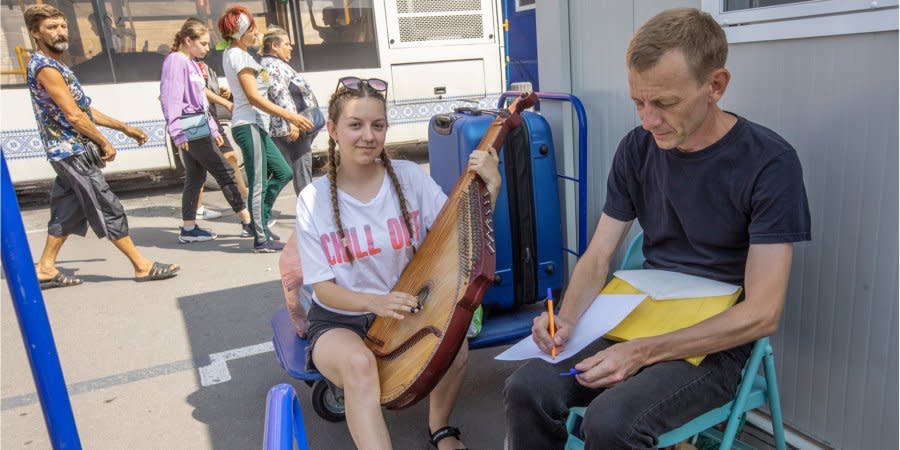
Early on Aug. 12, standing near her house in the village of Kushuhum, 19 kilometers from the city of Zaporizhzhya, local resident Liubov recalls how four powerful explosions woke her up two days ago.
“I set my alarm for 4 a.m., I wanted to dig up potatoes,” she says.
“I heard the alarm, decided to lie in bed for another five minutes, but a blast occurred.”
She immediately grabbed her disabled son and hid him in the bathroom. Then she began to count the impacts: a second, a third, a fourth. As it turned out later, the last one killed a woman.
Nearby, a bulldozer is filling up a huge crater in her yard, left over from that very shelling attack. Looking at it, Liubov says she and her son were very lucky to be alive.
Work is humming in the yard of one of her neighbors, Vira Ivanivna: men are repairing a power line damaged by the explosions. The woman herself and her grandson were sleeping at the time of the shelling. And although their beds were covered with broken glass, both escaped unharmed.
“The military is wondering how we survived,” the woman says.
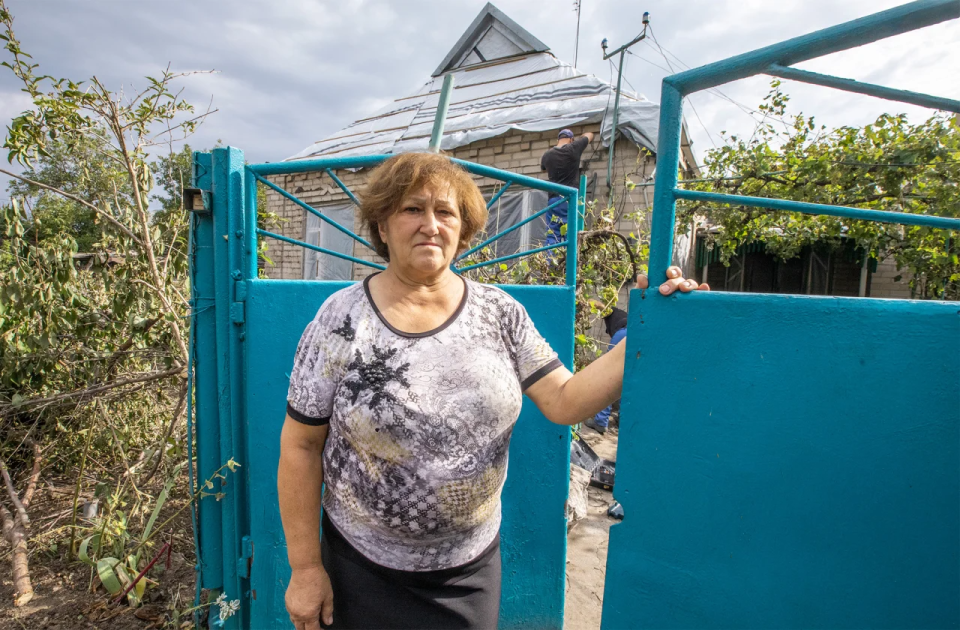
Her entire house, both the walls and the ceiling, is covered with cracks. Piles of soil, thrown by an explosion, have only recently been raked out of the middle of the house.
According to the village council, 69 houses were damaged in Kushuhum by the shelling that morning. Some of them cannot be repaired.
On the day when NV visited Kushuhum, the funeral of 52-year-old Tetiana was being held. She had lived alone, and her house was completely destroyed by enemy fire. The funeral was organized by Tetiana’s only son, a 21-year-old soldier who was allowed home from Kyiv for seven days to arrange his mother’s funeral.
Despite the terrible events, the locals are not panicking. Even so, there is an even greater threat here, as the Zaporizhzhya nuclear power plant (NPP), captured by the Russians and turned into a military base, is located quite close. The invaders are constantly shelling the NPP, threatening to turn it into a new Chornobyl.
“They (the Russians) are an inadequate people,” Liubov says. “They’re slaves who don’t even understand that they’re serving their master.”
Immediately after the invaders captured the NPP and its satellite town of Enerhodar, it became clear that this would not end in anything good for the region.
But the resident of Kushuhum hopes that things will not come to an accident and radiation leak, although she understands that anything can happen.
“If they tell us to evacuate, we’ll leave,” she says.
Cossack spirit
In Zaporizhzhya itself, there is no hint of any excessive anxiety over possible Russian actions at the NPP or in the region. Just like in Kyiv, people on the streets pay almost no attention to air raid alerts, with locals relaxing on the outdoor terraces of cafes as the sirens wail.
Read also: Enerhodar under occupation of madmen ‘threatening to blow up Europe’s largest nuclear plant’
But at every turn, you can see what the city thinks about the war and the enemy. “Zaporizhzhya is the territory of the death of invaders,” “Where to throw the Molotov cocktail,” “F*** Russia” – such “social advertising” in the form of billboards and various inscriptions can be seen all along the city’s 10-kilometer-long Svobody (Freedom) Avenue.
And there are also many portraits of Denys “Redis” Prokopenko, the Azov Regiment leader, who is currently in Russian captivity, with the inscription “Redis is a Hero of Ukraine.”
While NV was taking photos of these manifestations of public opinion, a man could be heard singing into a megaphone a famous song by Ukrainian musician Taras Petrynenko from the balcony of one of the high-rise buildings.
Yellow and blue ribbons, t-shirts with the inscriptions “Good evening, we’re from Ukraine,” even bags with the image of a postage stamp featuring a well-known Russian flagship – all this is now abundant on the streets of Zaporizhzhya. And it’s not because the city is preparing for Independence Day, it’s always like that here: the front is not far away, locals say.
Dmytro Hladkyi, a lawyer and deputy of the city council, explains: Zaporizhzhya residents do not behave like victims, despite the fact that the Russians have already occupied most of Zaporizhzhya Oblast. On the contrary, they are showing by their behavior and actions that the Russians cannot intimidate them.
“There are no signs that Zaporizhzhya would like to meet the invaders,” Hladkyi says. “If we meet, it will be only with weapons.”
The city has a huge number of volunteer initiatives that provide assistance to people who have left the occupied territories, he says. They also help the military. For example, automobile repair shops repair military vehicles.
People join the fight in whatever way possible. With the help of a mobile phone and a special app developed by international lawyers, Hladkyi records the war crimes of the Russians, such as the shelling of Kushuhum. In the future, the evidence could be used in Ukrainian and international courts.
Read also: Doctor tells his story of life under Russian occupation in Zaporizhzhia Oblast
“Years will pass, the roof will be repaired, life will return to a peaceful course,” Hladkyi says. “But we’ll ask why the criminals were not brought to justice. It’s important to collect and record everything now.”
As for the situation at Zaporizhzhya NPP, the local authorities have been publishing daily information on radiation levels since its capture. And as long as there are no deviations, people remain calm.
“Zaporizhzhya is trying to live and work, despite the potential threat here,” Hladkyi says.
But there is a threat.
Volunteer designer
Every day, refugees from the territories where the Ukrainian flag has been temporarily replaced with the Russian tricolor, gather at the entrance to Zaporizhzhya, on the Orikhiv highway. Here, at the parking lots next to the Epicenter construction superstore, there is a hub that receives and helps displaced people.
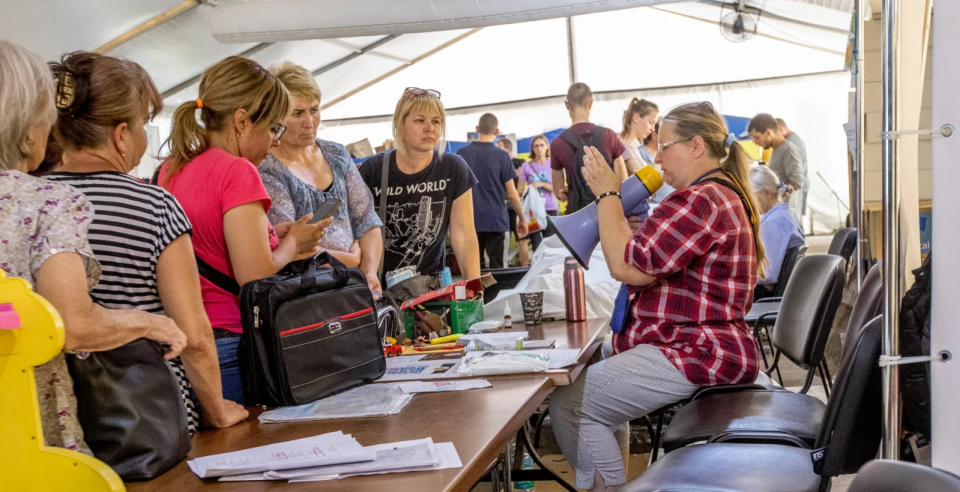
In a large tent at one of the tables, NV meets volunteer Natalia Ardalianova. Her job is to explain to those who have just arrived what to do next – to go to other Ukrainian cities or abroad.
NV asked Ardalianova what her job was before the war. But the volunteer does not have time to answer as she is approached by a woman who had just arrived from the occupied territories.
“I’d like to get to Warsaw, I worked there before the war, I have a place to live,” she says.
“You can get to Warsaw in two ways,” the volunteer answers. “You can leave for the border right now. Cross the border and volunteers will help you get to Warsaw. The second option is that tomorrow we will have a volunteer train wagon with seats. From the train wagon, we transfer by bus to Warsaw. So have a rest, drink some tea, and sign up for the option that suits you.”
“Then I’ll leave tomorrow,” the refugee says. “I have a friend in Zaporizhzhya, she will shelter me for the night.”
“Have a rest and come tomorrow,” Ardalianova told her and returned to NV. But another refugee came.
“Have you heard anything about Ireland?” she asked. “Are children accepted to schools without problems?”
“Yes, without problems, they are given one month for adaptation and another two for language courses,” the volunteer explains.
“We know English,” the woman says.
“That’s good,” Ardalianova replies. “First, you will arrive in Bucharest, complete a document, point out that you want to go to Ireland, wait a few days and leave.”
“It’s all for the kids. I don’t care where we go, we’re leaving for the sake of our child,” the woman says.
A third attempt to talk to the volunteer fails.
“Can I leave my bags here until 8 p.m.?” asks another visitor to the center.
“We don’t guard things. There are no luggage lockers here. But no one walks around me. Take the documents and you can leave your bags,” Ardalianova says.
Meanwhile, a fourth woman approaches her.
“How can I send documents to my son in Poland?” she asks.
“Why don’t you want to send them by post?” the volunteer answers very calmly.
“Is the post office open now?” the woman wonders.
And he hears in response: “Yes, it’s open.”
Finally, Ardalianova has a free moment. It turns out that she has been designing electrical networks for 30 years. When a full-scale invasion began, all of her projects became irrelevant. Then she saw on Facebook a vacancy for an administrator at a volunteer center. And since March 16, she has been here every day, helping with the organization of people’s departure.
“Previously, I worked with contractors, installers, designers. Therefore, what I’m doing now is not much more difficult,” Ardalianova explains. But her worldview has changed.
A few days ago, she came to her relatives’ birthday party, where the table was set with various dishes.
“I used to love it so much, but now it’s not interesting at all,” Ardalianova says.
“Now you eat one sausage and it’s enough. Instead, I understand that if I don’t come here to the center, it will be a disaster. That’s what I’m thinking about, not about beautiful things and delicious food.”
Scars from bullets and emotions
Meanwhile, an uproar breaks out on the street as a convoy of cars arrives from the occupied territories.
Forty-seven-year-old Nadiia with her two children, 14-year-old Sofia and 16-year-old Artem, are heading with their suitcases into the shade. Everyone is smiling. It turns out that this is a family from Mariupol. It took them three days to travel to Zaporizhzhya.
NV is interested in what is happening now in Mariupol. To which 14-year-old Sofia replies: “On April 5, we went to pick up humanitarian aid, because there was nothing to eat, our car was shelled. I was wounded in the shoulder blade.”
She lifts up her t-shirt to show a huge pink scar on her back.
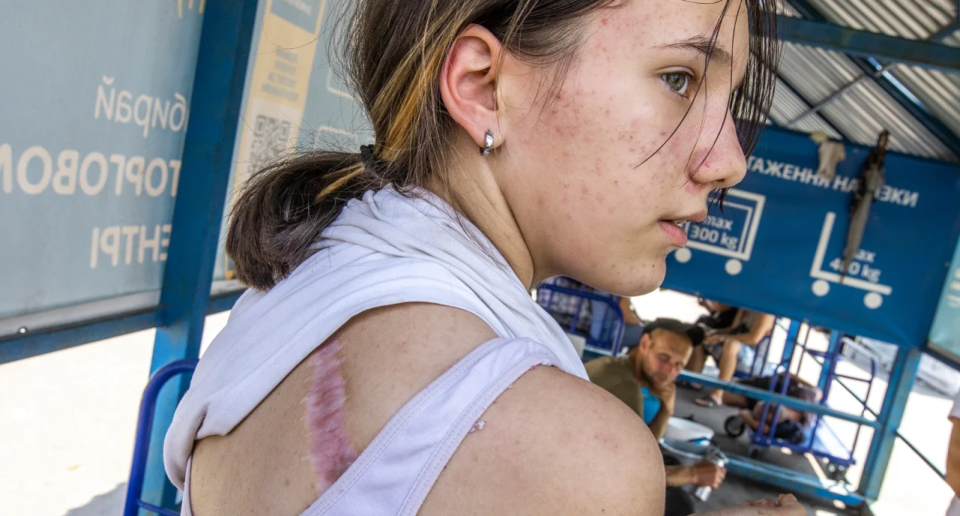
She was provided with first aid in Novoazovsk – they just washed the wound. She underwent surgery in Donetsk, staying in a hospital for more than a month.
“I had a fracture, a broken bone and a torn muscle,” she explains.
The family returned from Donetsk to Novoazovsk, where they were sheltered by a religious organization. Then they stopped in Mariupol for one day, picked up their belongings and headed to Zaporizhzhya.
“Mariupol has become a bit cleaner,” says 16-year-old Artem. “The corpses were removed from the streets and there is no corpse smell.”
And his mother remembers how they drove through the city and cried because of how destroyed it had become.
The family did not want to live in Mariupol and is now heading to relatives in Vinnytsia Oblast. They plan to finally take Sofia to a doctor there.
The girl says that she has a mental disorder and needs the help of a psychologist. After being wounded, she cannot bear to hear loud sounds at all and begins to have panic attacks.
“If I hear the usual sound of a car door closing, I start shaking,” Sofia says.
Psychologist Tetiana Balinchenko, a representative of the Doctors Without Borders international organization, works at the hub every day. Before the war, she worked as a psychologist in an orphanage. Its children were evacuated to a safe place, while Balinchenko decided to work with people from the occupied territories.
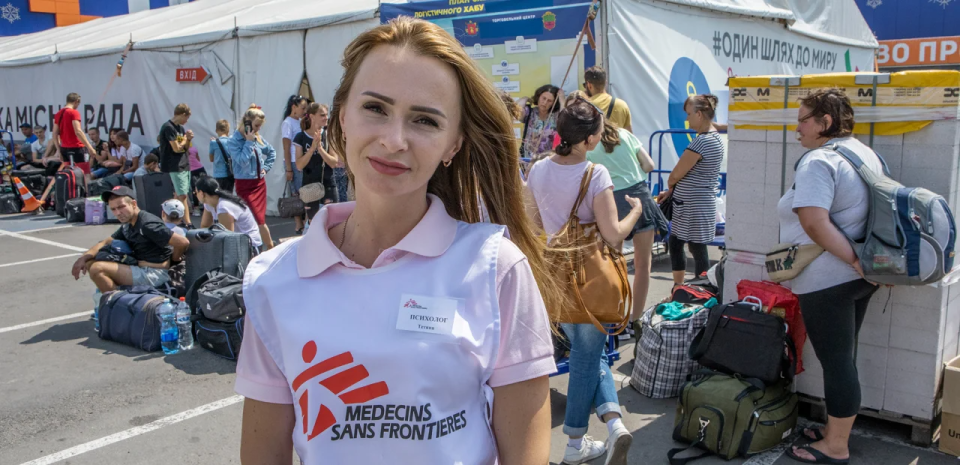
According to her, those who arrive here very rarely turn to a psychologist themselves. Usually, Balinchenko herself looks for someone to offer help to.
“Very often people break down, they cry and that’s good. A person feels better after that,” she says.
But many, on the contrary, close themselves off, sit in a stupor and do not know what to do next.
“Sometimes it happens: a person arrives, puts down a suitcase and does not even try to find information about what to do next. They just sit,” says Balinchenko.
Simple questions like “maybe you’re looking for a bus or a place to stay” can sometimes bring a person out of a stupor.
But Balinchenko also remembers a girl who arrived in July from the occupied territory in a warm winter jacket and could not contact anyone.
Sometimes mothers who complain that their young children lose sleep, have nightmares, and become hysterical turn to psychologists.
“Then you have to calm down the mother too and to explain that this is a normal reaction to an abnormal situation,” says Balinchenko.
There were also many cases when people wanted to return home to the occupied territories. There are a lot of such people.
Kherson bandura
A girl with long braids is sitting on a trolley for suitcases near people getting onto a bus heading to Vinnytsia. She is holding a bandura in her hands. A man is next to her, her father, who is showing her a music sheet.
This family has just arrived here from the occupied city of Kherson.
“When you walk around Kherson, you want to cry because you don’t recognize your native home – Russians are everywhere,” the girl, 16-year-old Svitlana Avhustina Polskykh, says.
She has been playing the bandura for 10 years and dreams of entering a conservatory. To take the bandura out of Kherson, the father and daughter invented a story for enemy checkpoints: it is a Slavic instrument and is also played in Belarus and Russia.
When one of the Russian soldiers checked the father’s laptop and found a recording of his daughter’s performance, he said only one thing: it’s a good musical instrument. He allowed them to leave.
The daughter’s vyshyvanka (embroidered shirt) was also taken out of the occupation, packed inside out.
Svitlana Avhustina Polskykh says that Kherson’s streets are empty at 3 p.m., people do not go outside their home district. The family hoped for a quick de-occupation of the city for a long time, but decided not to wait anymore.
“Kherson residents are such a heroic people that they were not afraid of explosions, but on the contrary, they went out to the balconies to film and look whether these were Ukrainian soldiers,” says Mykola Polskykh, the girl’s father. But many of them have already despaired of being liberated, he admits.
The father and daughter left primarily because the girl needs to continue her studies. They will go to Odesa from Zaporizhzhya, where they have neither acquaintances nor relatives. But the family hopes they will be able to find a new music teacher and not lose a year of her musical education.
At the moment when Svitlana Avhustina played and sang an excerpt from a Ukrainian lyrical song with the words “You can’t live without a dream,” the woman next to her, who also left Kherson, burst into tears.
“Everything will be fine. You can’t live without a dream,” the girl’s father reassured the woman.
Schools without students
Another family from Kherson Oblast that NV met in the Zaporizhzhya hub came here from the town of Nova Kakhovka and were heading to Germany.
Seventy-three-year-old Alla Kovalenko, her brother Valeriy, who suffered a stroke a few years ago and is in a wheelchair, and Alla’s daughter, Maryna, with two children aged three and five, left Nova Kakhovka for free thanks to a charity organization. However, people usually flee from there using the services of carriers who charge UAH 5,000 ($137) per person for a trip to Ukrainian-controlled territory.
The Kovalenko family also wanted to use the services of carriers, but none of them agreed to take a disabled person in a wheelchair. So the family had to wait several weeks for a bus of the charity organization.

Maryna told NV what life under occupation is like now: ATMs do not operate, there is no work. Only hospitals and markets are open. The Russians are trying to introduce the ruble into circulation, but people are doing everything not to use enemy currency. Payment is still in hryvnias in the markets, it is still possible to use bank cards in some stores, which people do. The occupiers also failed to rope school and kindergarten teachers into cooperating with them.
Maryna says only one teacher has agreed to cooperate in the school next to their house, where about 700 students previously studied. The invaders said the children would study only mathematics, Russian language and literature, as well as history.
Given that people do not want to send their children to such schools, the Russians began to threaten the locals with the deprivation of parental rights. So the residents of Nova Kakhovka predict that even more people with children will leave the occupied territories before the school year begins. Although, even now, there are mostly elderly people staying there.
Explosions constantly thunder over Nova Kakhovka now, and the situation is getting more and more tense.
When the Armed Forces of Ukraine fire at enemy depots, it is not so scary, Alla Kovalenko says.
“Scary, but we like that,” her daughter adds. “But when a missile is shot down, it’s scary because you don’t know where it might fall.”
Therefore, the family decided to take the children away from the hostilities. But they are convinced that Nova Kakhovka, like Kherson, will be de-occupied.
“We’re ready to wait a few months, until the New Year or however long it takes – just liberate our cities. I don’t believe they will remain under the Russian occupation,” Maryna says.
Her family is already on the way to a bus, which will first go to Odesa and then to Germany.
NV is on the way downtown of Zaporizhzhya, and later to the train station, as another air raid alert sounds.
Late on Aug. 12, after the train with NV team had left, the Russians shelled what had seemed to be calm and peaceful Zaporizhzhya. One woman was killed.
Read the original article on The New Voice of Ukraine

